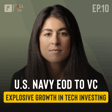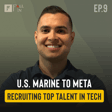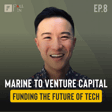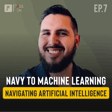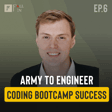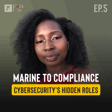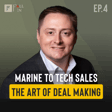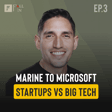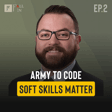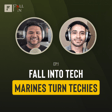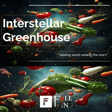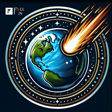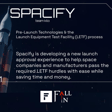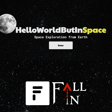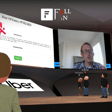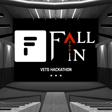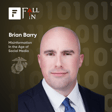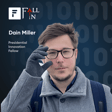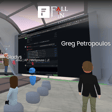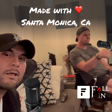Become a Creator today!Start creating today - Share your story with the world!
Start for free
00:00:00
00:00:01

Cosmic Chatter: Decoding the Universe with Citizen Science
Join Gladys Chiang and Adrian Garcia as they discuss their innovative hackathon project, Cosmic Chatter, which harnesses the power of citizen science to analyze radio signals from space. Discover how this platform could accelerate the search for extraterrestrial intelligence and explore its potential impact on space exploration and defense.
Links:
https://cosmic-chatter.vercel.app/
https://github.com/Team-Juliet
https://github.com/Muffy239
Transcript
Introduction to the Podcast
00:00:02
fall_in
All right, welcome everyone ah to the Fallen Vets Hackathon podcast. ah We're here with Gladys and Adrian.
Meet Gladys and Adrian
00:00:11
fall_in
um Yeah, Gladys, why don't you take it away by talking about your background and then I'll ask the same to Adrian.
00:00:19
Gladys Chiang
Yeah, thank you so much for having us here today. We're very excited. um My name is Gladys John, and this is my second year coming to full in Hackathon. And my little bit about my background is I'm currently working in different lab. I'm in a cardiovascular tissue engineering lab. And I stand for as well as an innovation lab that I joined recently. And I'm very excited to talk more about what we're doing at towards the end of the podcast.
Gladys' Work and Education
00:00:50
Gladys Chiang
um But I'm also ever since the last year oh with our winning record, I also going to a program at Berkeley and UCSF. It's called Master of Translational Medicine. Combining like my passion for like innovation in on medicine, I really hope in that program can bring more like like the technology part of it and how we can impact the field more. Yeah, thank you.
00:01:19
fall_in
Very cool. Yeah, looking forward to talking about that towards the end here. It looks like some really cool stuff that you're doing on the medical side of things. um
Gladys' Personal Injury Story
00:01:29
fall_in
Awesome. Speaking of, you said you got hand surgery not so long ago. How are you doing with that?
00:01:34
Gladys Chiang
I did look at me. I get a free pass to flip everyone off now.
00:01:36
fall_in
Oh my gosh.
00:01:41
Gladys Chiang
But yeah, I was doing research and I accidentally completely cut off my extensor tendon.
00:01:42
fall_in
Nice.
00:01:50
Gladys Chiang
And luckily I work at the VA hospital.
00:01:50
fall_in
Mm.
00:01:53
Gladys Chiang
So I went to the emergency room immediately. And what's funny that day was i was so much I was in so much shock, right? And I got in there, I start feeling the pain and the blood just won't stop. And I look at it, it was droopy, and I was like, hey, no biggies, few stitches. But then it it turns out it became a full-on surgery the next day. And I'm still in recovery, just had my hand therapy today as well. But one fun fact, I did all the design for this hackathon with one hand.
00:02:27
fall_in
Oh my gosh. Well, I'm glad you got the care and um i'm I'm glad it sounds like it's you're working towards progress here.
00:02:35
Gladys Chiang
Yeah, thank you.
00:02:36
fall_in
um Cool, Adrian, you want to give us your background?
Adrian's Military and Hackathon Journey
00:02:41
Adrian
Yeah, yeah. um So my name is Adrian Garcia. I just got out of the military last year. And um I just actually just finished up a bootcamp just before attending the hackathon. So it kind of aligned perfectly there. But now I'm just trying to um kind of on the job plan and studying for AWS certification right now. Super excited about it.
00:03:04
fall_in
Nice. So yeah, let's dive into the ah project that
Cosmic Chatter Concept
00:03:08
fall_in
you guys had built. um you know Cosmic Chatter, it was for this past hackathon, which just took place from um May 17th through the 19th and in the year of 2024, just in case anyone's curious. But um yeah, do you want to go and talk about what inspired Gladys?
00:03:30
Gladys Chiang
Yeah, yeah, definitely. oh Well, first, I think it took a lot of brainstorm session. And we ended up with cosmic chatter. Personally, I found this app really cool. um But we're definitely inspired by the dual goals of advancing scientific discovery, as well as enhancing national security, which is the the theme of this year's hackathon on space and defense. So by creating this platform like Cosmic Chatter, um we harness the collective power of citizen scientists so we can quickly identify potential extraterrestrial signals while also monitoring space for any unusual activities.
Scientific and Security Goals
00:04:18
Gladys Chiang
um that could impact our national defense or even just globally defense. right So um we we had this um democratize a porch so that not only accelerates scientific progress but also strengthen our space defense capabilities.
00:04:36
fall_in
That's awesome. That sounds really cool. um Adrian, did you have to switch teams in the beginning? ah Remind me, um or did you stick or did you start with Cosmic Chatter and end it with them?
00:04:50
Adrian
Yeah, I
Team Formation and Project Development
00:04:51
Adrian
started at Enderwood. I think me and Gladys had got in contact before it even started, and we're trying to brainstorm some ideas, so yeah.
00:04:57
Gladys Chiang
Oh.
00:04:59
fall_in
Cool. And what would you say that inspired you about it um to to get started with that with this particular project?
00:05:08
Adrian
I just thought it was ah it was a great idea. um One of our teammates had thought about it, and I was just really excited to get into like the programming aspect of it, so I was like, Um, kind of reaching out for Gladys to get the UI UX done. And then we were just kind of brainstorming. It was really fun.
00:05:25
fall_in
Nice.
00:05:25
Gladys Chiang
Yeah, we actually had a lot of project ideas that we came up with.
00:05:26
fall_in
um Yeah.
00:05:30
Gladys Chiang
One thing I was like, what if we had like a translator so we can potentially talk to aliens?
00:05:37
Adrian
yeah
00:05:38
fall_in
Oh, interesting. How would that work?
00:05:41
Gladys Chiang
You know, that was just like a wild drink I had to be able to chat with the aliens. But I'm glad we went for something more, um something that we can choose to get.
00:05:51
fall_in
Yeah, it reminds me of this movie. I can't um ah remember the name of it, but it's like the aliens come and they're like communicating with like ink and then there's like linguists that comes in and they're like having to interpret what the aliens are talking about. You guys know what movie I'm talking about by chance?
00:06:11
Gladys Chiang
Thank
00:06:11
Adrian
No.
00:06:12
fall_in
I'll try to pull it up. But um yeah, I mean, there's so much that you can do with like space um projects.
00:06:20
Gladys Chiang
you.
00:06:21
fall_in
um But I'm excited to learn more about cosmic chatter. and You know, I'm curious, how does how does the app leverage citizen science to analyze radio data? data um Yeah, ah Gladys, you want to take this one?
00:06:37
Gladys Chiang
yeah Yeah, sure.
Crowdsourcing and Cosmic Chatter
00:06:39
Gladys Chiang
Well, our um platform utilizes cross-sourcing to analyze the vast amounts of radio telescope data. ah But traditional method can be very limited right by the availability of experts in the field, their time and resources. so By providing this platform to open up to everyone, um we can engage a large number of citizen scientists. And that way, we can sift through all the data faster and quickly. And while identifying any app normalities, that might be missed right because of the limited resources they have.
00:07:19
Gladys Chiang
so really like um We just want to like be able to use this platform so we can potentially also engage like like low-resources communities if we have this out there. For those communities, such an underserved community who may not even know these things exist, right? And by allow allowing a different diverse communities, people, citizen scientists to come to participate, the inclusivity not only democratizes space exploration field, but also inspire more people to pursue like STEM and really would hope to foster a new generation of innovator thinking and also just help with scientific discovery and national security.
00:08:09
fall_in
Very cool. Adrian, do you wanna add any color to that?
00:08:13
Adrian
Yeah, um I think kind of the idea behind it was kind of like to make it a really open platform. And I think we had an idea to kind of gamify the some of the aspects
00:08:22
Gladys Chiang
Yes.
App Engagement Strategies
00:08:23
Adrian
of the of the application as well, which was very interesting.
00:08:26
Adrian
um But it was kind of just I think its role was to like have a very open environment. So people who aren't so familiar with the with the technology are able to come in and just look through everyone else's data and maybe play with it as well.
00:08:48
Gladys Chiang
Yeah, like and just on top of what Adrian said, we really just wanted to be like an open platform. So everyone had the access to, not just the experts like all like storing one place. We want to utilize the data for a more efficient purpose as well and just open it up.
00:09:07
fall_in
Cool. um I actually looked up the movie that I was talking about where aliens come in and they try to communicate.
00:09:12
Gladys Chiang
said
00:09:14
fall_in
It's called a Arrival.
00:09:15
fall_in
um So if anyone's ever curious, ah that's the movie I was talking about. um Just a little off tangent, do you guys have any favorite space movies worth mentioning? um I'm not sure how deep, no pun intended, but how deep you guys are into space. um Yeah, Adrian, do you have a, oh yeah, go ahead, glad
00:09:15
Gladys Chiang
um
00:09:34
Gladys Chiang
Adrian?
00:09:37
Gladys Chiang
Adrian, do you want to go first?
00:09:39
Adrian
Oh, you want me to go first?
00:09:39
Gladys Chiang
Because mine's a little bit more of my childhood memory.
00:09:40
Adrian
Yeah.
00:09:44
Adrian
Um, I think when it comes to space, maybe movie like district nine, that was pretty cool.
00:09:52
fall_in
Nice.
00:09:54
Gladys Chiang
For me?
00:09:54
fall_in
Yeah.
00:09:55
Gladys Chiang
Oh, sorry, go ahead.
00:09:57
fall_in
No, please.
00:09:58
Gladys Chiang
No, for
Favorite Space Movies
00:09:59
Gladys Chiang
me, I think I'm low, but still a little bit on the immature side of me. It's how I love Lilo and Stitch. It's not like any sign of Stitch movie.
00:10:08
fall_in
I didn't know that was a space movie.
00:10:12
Gladys Chiang
Well, I just love, I love Stitch. And, you know, that's an alien. I love aliens.
00:10:23
fall_in
Yeah, it showed on the designs. I mean i thought i was thoroughly impressed with the design work, you know more than any any project that we've had. um And it's so colorful colorful and um everything's as like aesthetically pleasing. So kudos to the design work you've done. um It really shows that you've got like a passion for ah aliens. And it just yeah it makes sense um why ah you guys chose Cosmic Chatter. um
00:10:55
fall_in
yeah Going back to the project, I'm curious, what are some of the samples of the types of signals that could potentially indicate you know there's extraterrestrial intelligence um or unknown technological activities in space?
00:11:14
Gladys Chiang
Adrian, do you want to go first?
00:11:16
Adrian
Yeah, um I think from what we found from the data we were trying to look at was kind of any of the sound signals because I think if I recall correctly there was some data that were coming that was coming out of NASA that would kind of take in any of the frequencies out there in space and try to like um just turn it into like a PDF or not a PDF, but like an MP4 file that
Detecting Extraterrestrial Signals
00:11:41
Adrian
we could listen to. Very interesting. um Yeah, that's that's all I remember.
00:11:49
fall_in
Yeah, Gladys, any other examples?
00:11:51
Gladys Chiang
yeah like you know the research side came out of me when we did this um about like abnormalities and all that so like i i google that so this is definitely not like an expert opinion so take it with a grain of salt right but some like the research have done that potential signals that shows like
00:11:51
fall_in
um
00:12:16
Gladys Chiang
unknown technological activity with just abnormalities it includes like the radio signal like not being like narrow bandwidth so apparently like it shows that like it's not natural basically and another example is that if it's too structured the pattern of the signal and that's also doesn't match with the natural phenomena um and another thing that we will hopefully um incorporate in the tutorial is like just all this information about how to detect abnormality.
00:12:50
Gladys Chiang
um um So for users to really use that like as a way so that everyone could be a cosmic detector.
00:13:01
fall_in
Very cool. um you know what or How could a fully developed version um impact our understanding of space and potentially influence national defense? ah Do you guys have any opinions around that?
00:13:25
fall_in
And I could rephrase the question if it doesn't make sense. I know it's a bit chunky here.
00:13:30
Gladys Chiang
Hmm.
00:13:30
Adrian
Yeah, so my understanding of that is kind of like trying to see the functionality our application might tie into like something in space the defense.
00:13:33
Gladys Chiang
Hmm.
00:13:40
Adrian
Is that kind of what you're asking?
00:13:42
fall_in
Yeah.
00:13:44
Adrian
um I think it wouldn't lie more towards like just kind of crowdsourcing um maybe images or audio that is coming out of space and maybe trying to identify some of the objects out there.
00:13:59
fall_in
Yeah, so for example, my friend Robert is a astrophotographer. He's got this telescope by Unisteller, you know, works with the iPad and Are you saying that we can take these images and run it through your app and it would give us some type of signal or some type of um data on on this image?
00:14:24
Gladys Chiang
That could be like a future development, right? Like you mentioned, when cosmic chatter is fully developed. um So far, we can look at different things. Maybe Adrienne can take over on the different functions or like the data we can use, such as like audios. um But honestly, I think that once it's developed, our um it can be very much used by um um adaptive for like national security or defense, right? And to monitor ah space for unusual activities or potential threat. So just help us better prepare or respond to any like um space-based threats, or just even for like and um people who are passionate about space, being able to dive into the unknown is very exciting.
00:15:18
fall_in
Yeah, and now when it comes to the app that's um or the prototype you guys have built, you know, I noticed that's mostly in Python. Did you guys use any APIs that you plugged into? um And you know if so, what are those? And um yeah, maybe, Adrian, you can take this one on how the app really works on getting you know um audio and turning that into some type of signal.
00:15:50
Adrian
Yeah, um so we didn't to get to the to the point where we're implementing any ah APIs or um even making any costs or any external um sources. But that was definitely in our plan for development. As far as taking in user data, we were yeah we're going to streamline it from the front end using just the form and then maybe passing it through our database. That's the idea I had going into it, at least.
00:16:21
fall_in
Cool.
Designing Cosmic Chatter
00:16:23
fall_in
um Let's switch to the design side of things. um Gladys, huck how was the UI designed for accessibility, in your opinion?
00:16:34
Gladys Chiang
Oh, definitely. i So when you land on the homepage, there are three big buttons that I purposely put it around like the globe or like the earth. So it's like to analyze, record, or even upload audio. I want to make sure like um you users can be can easily utilize our functions i'd like just like a big. I don't want it to be like a beautiful. I want it to be beautiful but practical. So when I design the user interface, I definitely have like, I want it to be human centered. And also, like Adrian mentioned before, we try to gamify it. So I had like a little storyline even draft out. um I even call like our users the cosmic detectors, just to make it fun. Because while we're chatting about it, like as a group meeting, I remember I was like, this is like,
00:17:30
Gladys Chiang
i don't I don't have like a better reference, but to me it's so cool. It's like 007 in space. I'm trying to solve something and be part of something that can contribute to like better security.
00:17:45
fall_in
Yeah. Um, have you guys put much thought into what like extra to extra, uh, I don't even know how to say it so long, like alien, um, signals could potentially even sound like, um, yeah. Do you guys have, uh, do you guys put any thought towards that?
00:18:07
Adrian
I didn't, I didn't really think about it too much, to be honest. um I just kind of expected users to look for things that are abnormal to us because we probably, I feel like if something isn't really sticking out to us or something isn't really common for us to listen to, it would be very, very, what's the word? very potent, something very distinct that you'd be able to call out. And that was kind of part of our application as well as like back to like the whole browser thing. I think that Gladys had the idea of having a discussion forum, which was i'm going to be used to kind of like, um, in tandem with the analyze functionality of the application. So people can kind of look through the audio that was being taken in and maybe talk about it and theorize about their ideas as well.
AI Visualization Features
00:19:00
Gladys Chiang
um On top of that, I think during our group discussion, we also came up together with the AI visualizer. So um when you mentioned that, actually, I haven't thought about what it will sound like, but I thought about, I want to know what it will look like based on what AI think. So I think that feature is so cool to me, because you never know, right? Maybe AI knows it better than it is, what it will look like.
00:19:26
fall_in
You never know.
00:19:27
fall_in
um Yeah, I'm gonna have to ah search it on these like image generator prompts or ah image generator tools and prompt something.
00:19:27
Gladys Chiang
You never know.
00:19:35
Gladys Chiang
All
00:19:37
fall_in
um Cool. Adrian, did you have any like notable ah experiences during the hackathon, whether it was like you know, a team collaboration session or maybe a particular speaker. um anything Anything notable sticks out, sticking out from the Hackathon.
00:19:53
Gladys Chiang
right.
Hackathon Experiences and Learnings
00:19:57
Adrian
Uh, yeah, I remember the general coming in and I thought that was a very nice experience for us to have, um, having his like very interesting background working at Guantanamo, I believe it was. So that was really cool.
00:20:11
fall_in
Yep.
00:20:13
Adrian
In terms of like development and things, we did expand and I was playing with some of the tech that I have not touched yet. Yeah. At least it was like next JS and TypeScript. So that was pretty interesting on that end.
00:20:25
fall_in
Cool. Yeah, what about for you, Gladys? I know you were mostly designing, but I don't know if you got a chance to check out any of the speakers, but anything notable on your end from the hackathon?
00:20:36
Gladys Chiang
Honestly, I wanna not kudos to you guys in, like, structuring everything that works out to speakers. But what stood out to me is actually at the end, where Adriana came in for, like, a retrospective session. I don't recall having that last year, but I really think this is a great touch. So we know how to to improve, ask any questions, and how do we further um better ourselves and think about, like, what could have done better and what we're good at. So I really appreciate that.
00:21:07
fall_in
nice Nice Touching on the military side of things since you know, it is a vet's hackathon Adrian um You know, did you know you're gonna get into tech um as you're getting out? um What was that story like?
Adrian's Tech Journey
00:21:22
Adrian
Yeah, so actually, I have a very convoluted, interesting journey in that regard. i I was out in Maine is where I'm from. And I didn't have like the best grades going up.
00:21:35
fall_in
Yes.
00:21:38
Adrian
And I was like, Oh, what can I do from here? So I'd kind of brainstormed and did it kind of like last minute or very impulsively, at least. I remember I contacted the recruiter, decided I was going to join the Air Force. And then two weeks later I was down in Texas. So that was very interesting.
00:21:54
Gladys Chiang
Ugh.
00:21:55
Adrian
But the the idea behind that was to serve my time. And then, um, use the benefits that I got to kind of explore the things that it really interested me, which was tech itself.
00:22:08
fall_in
Very cool. um Were you considering joining any other branches while you were kind of researching? ah Did the Marine Corps ever cross your mind or anything?
00:22:19
Adrian
Yeah. Um, the Marine Corps, the RME, yeah, I definitely looked at everything and then, um, I think everyone kind of knows, but I looked at the quality of life and I was like, oh man, the Air Force seems like it's the it's the way to go. So I just ended up taking that based off of that.
00:22:37
fall_in
Nice.
00:22:38
fall_in
Yeah, I don't, I don't blame me at all. Um, cool. Um, yeah, going back to the hackathon project, you know, it was a very short term project, but, um, do you guys believe that platforms like cosmic chatter could meaningfully accelerate the search for extraterrestrial intelligence?
00:22:38
Gladys Chiang
Well.
00:23:01
fall_in
Yeah. Glad to see you want to take this one.
00:23:03
Gladys Chiang
Yeah, absolutely. the The collective intelligence and diverse perspective that citizen scientists can lead to many new discoveries and insights that might be missed by a smaller group of experts. And that's why I think this platform is so crucial because of how openly accessible this data can be. and actually this just reminds me of this um saying in Mandarin actually um it's called like three humble shoemakers are better than one Zhuge Lian okay let me give a little background so like if you may wonder like who is Zhuge Lian right Zhuge Lian is actually a renowned strategist in ancient China it's very much known for his like wisdom
00:23:39
fall_in
Yeah.
00:23:50
Gladys Chiang
and intelligence. So the phrase, three humble shoemakers are better than one, zhugele is actually to highlight, to teach us that the power of collective effort, where the um the combined knowledge and skills of many can surpass that of a single expert. And I will i think it's it's perfect to use it in this incident, where we're trying to
Crowdsourcing in Medicine
00:24:15
Gladys Chiang
collect all these green mines, diverting experience from citizen scientists so we can further improve um our discoveries in extraterrestrial intelligence or even just for space defense.
00:24:30
fall_in
Very cool. um Yeah, it's a it's awesome story there. um You know, Adrian, I'm curious, what other fields do you think could benefit from um citizen science?
00:24:31
Gladys Chiang
Yeah.
00:24:49
Adrian
I feel like um there would be application and in many fields. I think just like Gladys had mentioned, I think there's power in numbers and just having a platform where everyone can come together and maybe do some research or meet other people that are interested in the same thing.
00:24:59
Gladys Chiang
Thank
00:25:09
Adrian
I think that'll be very helpful.
00:25:13
fall_in
Yeah, and then do you have any takes on this on this as well as far as what other fields could benefit lettuce?
00:25:20
Gladys Chiang
Yeah, yeah, definitely. So giving my background and my my passion in translational medicine and and medical innovation, I see incredible potential in like k crowdsourcing on these citizen science in medicine. um So actually I want to touch upon like how this will be useful in regard of the parallel advancement in in AI, right? So right now AI has made big strides in analyzing medical data and identifying patterns. And there are areas where human insights is truly invaluable.
00:25:58
Gladys Chiang
So for example, crowdsourcing can be really beneficial in enhancing clinical research by involving patient and caregivers in reporting real world health outcomes and side effects. And then also in terms of like maybe like rare disease research, patient and their family can also use like a crowdsourcing platform to contribute to like unique insights and data. that can be crucial in understanding these rare conditions and to help further develop more treatments.
00:26:30
Gladys Chiang
so
00:26:33
Gladys Chiang
And one story short, crowdsourcing and in medicine um would be like something that I see um as something to speed up our scientific discovery even more and also empower individuals who play an active role in their health and well-being. And going back to our cosmic matter, a chatter, sorry, cosmic chatter, oh yeah It's the same thing in like empowering those individuals to take part in their citizenship responsibility and know that you know national security um could be part of their like contribution as well.
00:27:10
fall_in
Very cool. um Adrian, I wanted to ask a little bit about your experience with Code Platoon.
Coding Bootcamp Experience
00:27:19
fall_in
um you know Could you talk about what that experience was like, um how you chose Code Platoon, and um yeah just your journey with them so far?
00:27:30
Adrian
Yeah, so I was actually looking at at a bunch of different um coding bootcamps at the time. And I was really looking for something that was veteran friendly or someone that could speak to to my experience in the military. And I ended up just coming across Code Platoon, looking at their curriculum and um I guess their kind of motto. And it seemed very, very friendly for veterans and military spouses as well. And that's how I ended up really choosing.
00:28:00
Adrian
ah My experience inside of the, inside of my cohort was really nice. We had a bunch of people, I think our cohort was one of the largest that they had so far. um We had people all over the ah the US, so that was really exciting.
00:28:11
fall_in
Wow.
00:28:17
fall_in
Cool.
GitHub Profile Animation Discussion
00:28:18
fall_in
And, um you know, on your GitHub, you got this like little um animation where like, um you know, your name, it's like, hello there. And then your name are using like a widget or or some type of plugin. um How did you how did you ah get that going on your GitHub?
00:28:36
Adrian
Yeah, I believe that's a functionality from a website that I used inside of the read me there. That was, that was very interesting.
Hackathon Key Takeaways
00:28:44
Adrian
They actually helped us configure our GitHub profile and kind of set it up at Code Platoon as well. So that was nice.
00:28:54
fall_in
Very cool. um And then. um As we're wrapping up here, I got a couple more questions here, but yeah, Gladys, do you have any key takeaways from this year's hackathon? um Yeah, as far as working on the project or working on the design or hearing from other projects, any any takeaways on your end?
Team Dynamics and Project Success
00:29:20
Gladys Chiang
yeah i think first i want to give a big shout out to adrian he's a great team lead right i think he really made sure that you know we're on top of things and and everything was great now we're also we're pretty lucky to have like pretty good team where like people gather and try to figure things out and we we definitely bring storm pretty
00:29:36
fall_in
you
00:29:40
Gladys Chiang
ah very good ideas and I'm glad that you know we ended up choosing Cosmic Chatter. um ah Another thing that I want to mention is that I just love career collaborat collaboration. I think that's something that keeps making me come back to Hackathon to fall in. it's how great the environment is, everyone's super nice and friendly and they're just here to like making sure that like you know you can get a star in your career um in tech even though you you didn't come from that background and for me um
00:30:13
Gladys Chiang
all like I met ah a bunch of amazing people like like Adrian, right? Actually after our project ended, we we also gathered together with other team members and our friends, their friends, um to contribut continue to develop more solutions and more innovative um ideas together.
00:30:18
fall_in
Bye.
00:30:35
Gladys Chiang
And that's what I love the most about this hackathon.
00:30:39
fall_in
Awesome.
Hackathon Collaboration Benefits
00:30:40
fall_in
um When you talk about um collaboration, it's like, You know, obviously you do a lot of that at the workplace, but I think a large percentage of the veterans that attend are kind of looking for their next role in tech. And I think having that practice in and doing collaboration helps a lot. um I wanted to also ask,
00:31:11
fall_in
um
00:31:14
fall_in
you know, um
00:31:19
fall_in
What was I going to say? I'm going to.
00:31:20
Gladys Chiang
Thank
Overcoming Challenges and Success
00:31:22
Gladys Chiang
you.
00:31:22
fall_in
All right, so what I was thinking was like, did you guys anticipate, you know, coming top, you know, placing top third or I'm sorry, placing the top three and actually winning second place? um You know, yeah, were you guys anticipating that? And how did you guys feel after learning that you guys actually did win second place?
00:31:45
Adrian
Do you want to tackle that first, Gladys?
00:31:47
Gladys Chiang
yeah i can go first um i was a little bit nervous at first i remember the day of on sunday oh actually let's go back we want a little bit back to saturday i finished the design and then i was like okay like our back end Got it. We're gonna be great. oh Tomorrow, easy peasy, I woke up to a phone call. I think Tonjae called me and she said that, you know, I really need to have a group meeting right now. And in terms of like, um one of our um
00:32:23
Gladys Chiang
back end like he he got sick and I know and then like a lot of things happened so there's actually some kind of like um we we all got really nervous let's just say that um but then Adriana came in she's very helpful she say and she really encouraged us to not give up and to like do our best even to show the prototype and that we can still have hoping winning hackathon and immediately everyone like get on like the um start like divide and conquer right because i think by then we only have
00:33:01
Gladys Chiang
less than three hours to create a prototype and present it to everyone. um So we I remember I called i told them, okay, I can get back to it. I just need to have like a long time by myself to focus. And diamonds are made under pressure and I believe in that. And I think it's because through all this teamwork, feedback, collaboration, um when we when it's our turn to present, I was actually really happy, given that with the obstacles and limitations we had, we gave our all.
00:33:38
Gladys Chiang
And I think that's more precious than anything. But it's definitely an honor to um to get like second place to one second place among all these amazing projects. And I learned a lot about space and what innovative ideas we could contribute to this sector as well through listening in to other people's presentation.
00:33:51
fall_in
Okay. Okay. Okay.
00:34:01
fall_in
Awesome.
00:34:01
Gladys Chiang
how about you adrian
00:34:04
Adrian
Yeah, um coming in, I really didn't have any expectations. um The only thing I wanted to get out of it was to like ah collaborate with others and kind of just get away at programming. So I was really excited about that.
00:34:17
Gladys Chiang
How
00:34:19
Adrian
I ended up meeting a lot of lot of interesting and amazing people.
00:34:23
Gladys Chiang
about
00:34:23
Adrian
um Yeah, like Gladys had mentioned, a couple of us from the group had gone after um and
00:34:28
Gladys Chiang
you Adrian?
00:34:33
Adrian
are working on a program now, so thats that was pretty nice to to do. But yeah, I was really nervous when the town was in a crunch. We were definitely trying to make the best of it.
00:34:46
fall_in
Nice. um Yeah, as we kind of wrap up here, Gladys, I wanted to touch upon
Introduction to Woodpecker AI
00:34:55
fall_in
this. It looks like you're working on this special project um in the medical side of things, helping um scribes,
00:34:59
Gladys Chiang
Bye
00:35:05
fall_in
um ah which my understanding is scribes are um ah medical sort of assistance who like take notes and kind of prepare the physician. um But yeah, I would love to hear more about this project.
00:35:24
Gladys Chiang
-bye.
00:35:25
Gladys Chiang
Yeah, thank you for mentioning this. So a group of ah group of us in the Bay Area, we recently launched an AI medical scribe tool. It's called Woodpecker AI. And so the reason why this is of useful is because we do notice that um a lot of clinicians are battling with burnout. And there are research suggesting that a lot of them is actually coming from like um these like clinical charting. And also whats those like um like with those like visits, like patient visits, a lot of them were spending a lot of time in front of their monitors while talking to patients, right? So what if we could create a tool that can enhance patient care as well as reducing their time spending on clinical charting by focusing on something that matters, which is patient care.
00:36:22
Gladys Chiang
So we launched Woodpecker um for free, entirely free, because our goal is truly to alleviate such burnout and also enhance quality of patient care. um Some of the features we have is like we're HIPAA compliant. And we definitely don't sell your data. So feel free to use it and try it out. And everything storing a very safe and encrypted place is very fast. We're a very comfortable to all the leading tools right now on the market, but worth offering for free.
00:36:55
Gladys Chiang
So we're definitely recruiting a lot of pilot users right now from like underserved areas, low resources, places.
00:36:59
fall_in
you
00:37:04
Gladys Chiang
um But really, we welcome all users who can benefit from this tool so we can help save your time. So yeah, like if you guys know anyone, yeah like from like military doctors, um nurses, or just anyone who's like interested in, they can always reach out to me.
00:37:23
fall_in
Very cool.
How Woodpecker AI Works
00:37:24
fall_in
I'm curious on exactly um you know the functionality of the app. So it looks like there's an AI involved. and um Can you talk about how it works and how it functions?
00:37:36
Gladys Chiang
Yeah, definitely. It's a very simple interface. We definitely want to make sure it's easy and flexible to use. So all you need is a really a computer or even like a mobile phone with Wi-Fi access. Sign in to Webpack your website. And then immediately when you start chatting with your patient, it captures your voice, transcribe it for you. So we have all the raw transcription data there. And then at the end of the visit, you can kind of look into it or just generate the clinical notes.
00:38:06
fall_in
you
00:38:08
Gladys Chiang
And one big thing feature that we have is that we have different templates for different specialties. So you can choose which template you have. So when you generate the note, it tailors to exactly what you need. So you can just copy and paste that into your electronic medical record um so choose to make it easier for you.
00:38:31
fall_in
Nice, it sounds like it's going to save a lot of time for medical professionals um and even the patient. um So, yeah, kudos on working on this.
00:38:41
Gladys Chiang
Thank you.
00:38:41
fall_in
um Awesome.
Conclusion and Future Plans
00:38:44
fall_in
um Yeah, I don't have anything else. I think I'm going to go watch Lilo and Stitch after this if you guys watch Arrival. But ah yeah, thanks again for joining and hope you guys continue to check out our future hackathons.
00:38:58
Gladys Chiang
yeah Thank you us.
00:38:58
fall_in
All right, everyone.
00:39:00
Adrian
Thank you.
00:39:01
fall_in
All right, that's the pod.
